|
libfoedus-core
FOEDUS Core Library
|
|
libfoedus-core
FOEDUS Core Library
|
Retrospective lock list. More...
Retrospective lock list.
This is NOT a POD because we need dynamic memory for the list.
Definition at line 189 of file retrospective_lock_list.hpp.
#include <retrospective_lock_list.hpp>
Public Member Functions | |
| RetrospectiveLockList () | |
| Init/Uninit. More... | |
| ~RetrospectiveLockList () | |
| void | init (LockEntry *array, uint32_t capacity, const memory::GlobalVolatilePageResolver &resolver) |
| void | uninit () |
| void | clear_entries () |
| LockListPosition | binary_search (UniversalLockId lock) const |
| Analogous to std::binary_search() for the given lock. More... | |
| LockListPosition | lower_bound (UniversalLockId lock) const |
| Analogous to std::lower_bound() for the given lock. More... | |
| void | construct (thread::Thread *context, uint32_t read_lock_threshold) |
| Fill out this retrospetive lock list for the next run of the given transaction. More... | |
| const LockEntry * | get_array () const |
| LockEntry * | get_entry (LockListPosition pos) |
| const LockEntry * | get_entry (LockListPosition pos) const |
| uint32_t | get_capacity () const |
| LockListPosition | get_last_active_entry () const |
| bool | is_valid_entry (LockListPosition pos) const |
| bool | is_empty () const |
| void | assert_sorted () const __attribute__((always_inline)) |
| void | assert_sorted_impl () const |
| LockEntry * | begin () |
| LockEntry * | end () |
| const LockEntry * | cbegin () const |
| const LockEntry * | cend () const |
| const memory::GlobalVolatilePageResolver & | get_volatile_page_resolver () const |
Friends | |
| std::ostream & | operator<< (std::ostream &o, const RetrospectiveLockList &v) |
| foedus::xct::RetrospectiveLockList::RetrospectiveLockList | ( | ) |
Init/Uninit.
Definition at line 39 of file retrospective_lock_list.cpp.
References clear_entries().

| foedus::xct::RetrospectiveLockList::~RetrospectiveLockList | ( | ) |
Definition at line 45 of file retrospective_lock_list.cpp.
References uninit().

|
inline |
Definition at line 548 of file retrospective_lock_list.hpp.
References assert_sorted_impl().
Referenced by construct(), and foedus::xct::CurrentLockList::prepopulate_for_retrospective_lock_list().


| void foedus::xct::RetrospectiveLockList::assert_sorted_impl | ( | ) | const |
Definition at line 182 of file retrospective_lock_list.cpp.
References foedus::xct::lock_assert_sorted().
Referenced by assert_sorted().


|
inline |
Definition at line 254 of file retrospective_lock_list.hpp.
| LockListPosition foedus::xct::RetrospectiveLockList::binary_search | ( | UniversalLockId | lock | ) | const |
Analogous to std::binary_search() for the given lock.
Definition at line 193 of file retrospective_lock_list.cpp.
Referenced by foedus::xct::Xct::on_record_read_take_locks_if_needed().
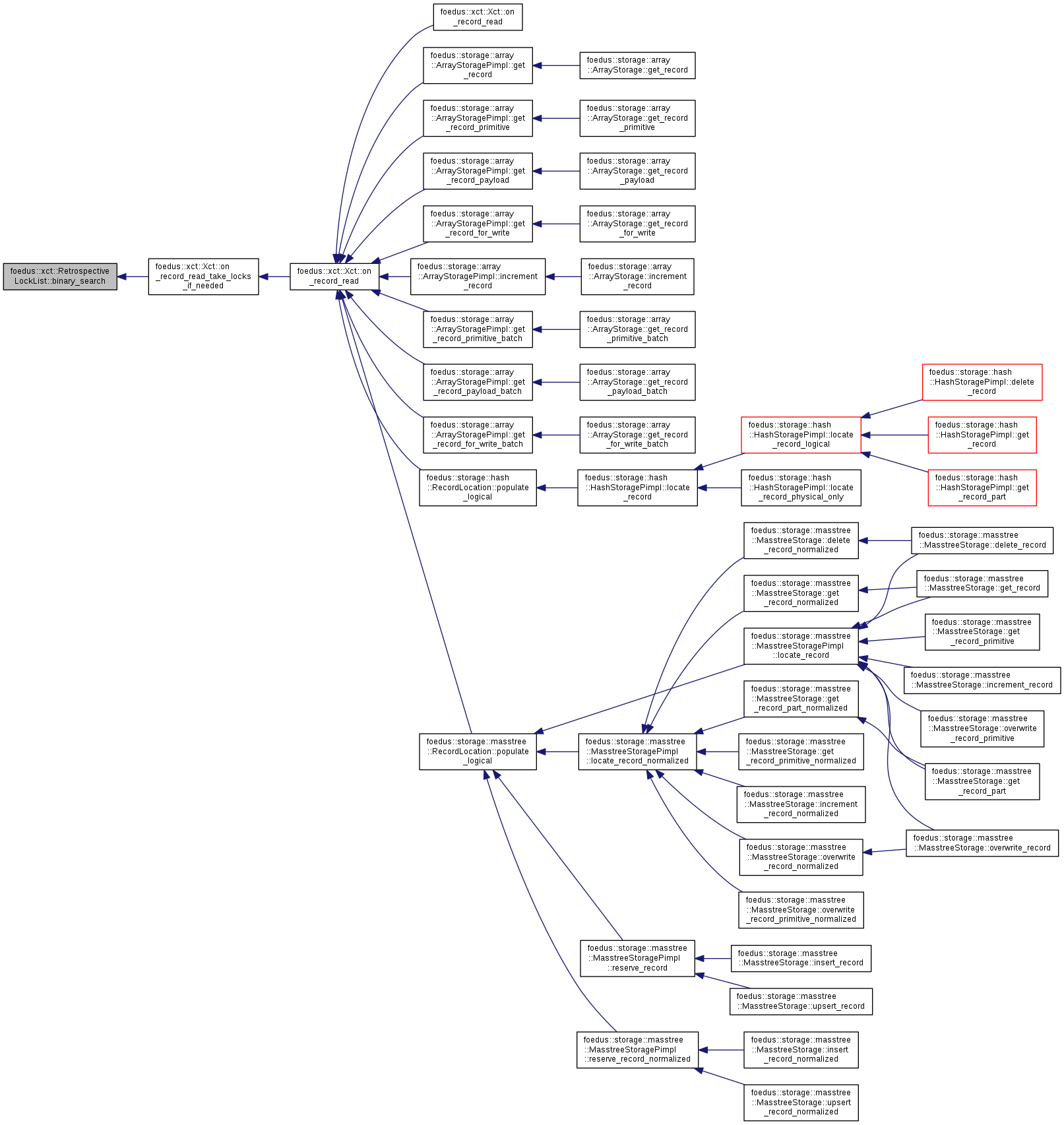
|
inline |
Definition at line 256 of file retrospective_lock_list.hpp.
|
inline |
Definition at line 257 of file retrospective_lock_list.hpp.
| void foedus::xct::RetrospectiveLockList::clear_entries | ( | ) |
Definition at line 59 of file retrospective_lock_list.cpp.
References foedus::xct::kLockListPositionInvalid, foedus::xct::kNoLock, foedus::xct::LockEntry::lock_, foedus::xct::LockEntry::preferred_mode_, foedus::xct::LockEntry::taken_mode_, and foedus::xct::LockEntry::universal_lock_id_.
Referenced by foedus::xct::XctManagerPimpl::abort_xct(), init(), foedus::xct::Xct::on_record_read_take_locks_if_needed(), foedus::xct::XctManagerPimpl::precommit_xct(), RetrospectiveLockList(), and uninit().
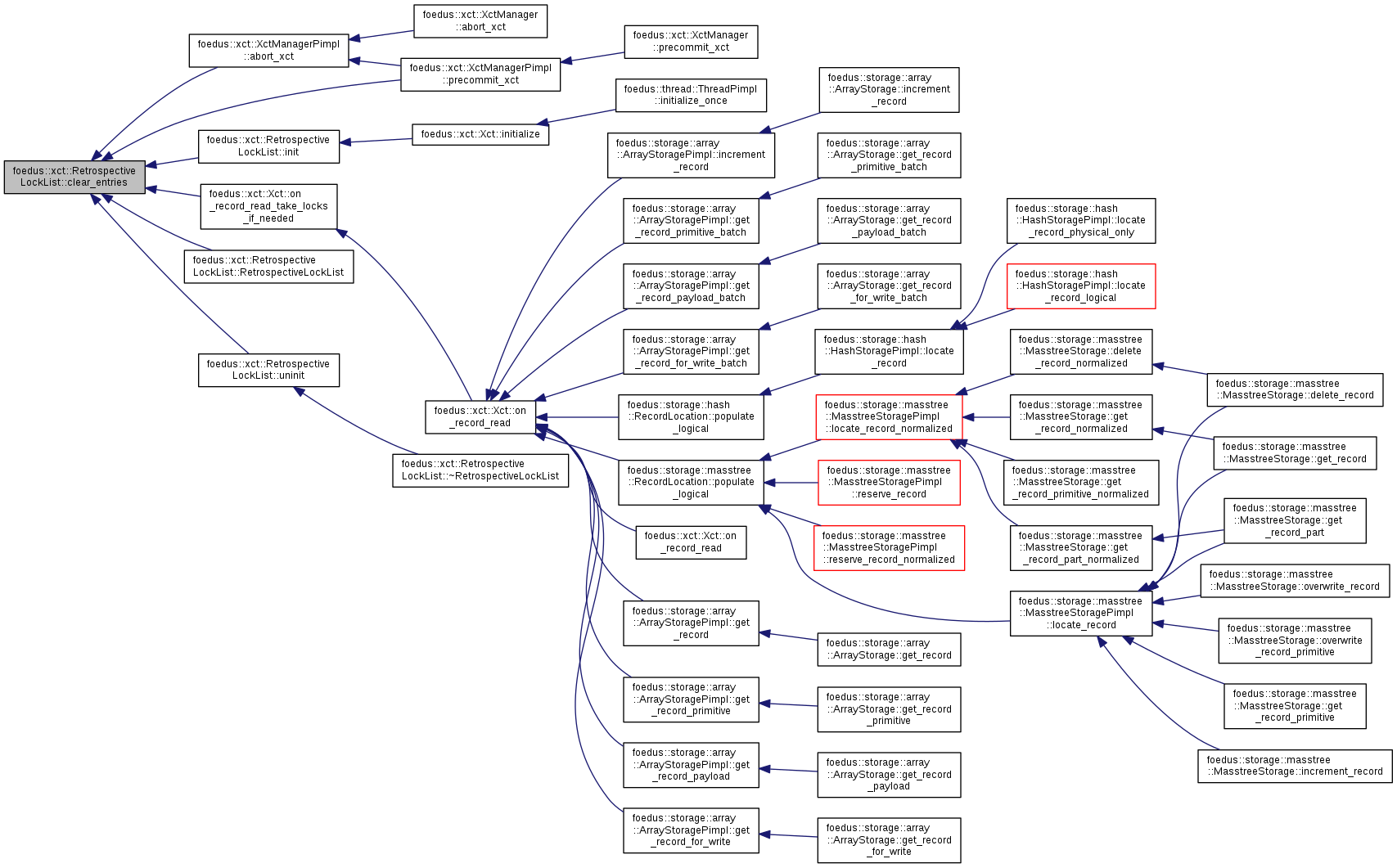
| void foedus::xct::RetrospectiveLockList::construct | ( | thread::Thread * | context, |
| uint32_t | read_lock_threshold | ||
| ) |
Fill out this retrospetive lock list for the next run of the given transaction.
| [in] | context | the thread conveying the transaction. must be currently running a xct |
| [in] | read_lock_threshold | we "recommend" a read lock in RLL for records whose page have this value or more in the temperature-stat. This value should be a bit lower than the threshold we trigger read-locks without RLL. Otherwise, the next run might often take a read-lock the RLL discarded due to a concurrent abort, which might violate canonical order. |
This method is invoked when a transaction aborts at precommit due to some conflict. Based on the current transaction's read/write-sets, this builds an RLL that contains locks we probably should take next time in a canonical order.
Definition at line 252 of file retrospective_lock_list.cpp.
References ASSERT_ND, assert_sorted(), foedus::thread::Thread::get_current_xct(), foedus::storage::Page::get_header(), foedus::xct::Xct::get_read_set(), foedus::xct::Xct::get_read_set_size(), foedus::xct::Xct::get_write_set(), foedus::xct::Xct::get_write_set_size(), foedus::storage::PageHeader::hotness_, foedus::xct::Xct::is_active(), foedus::xct::kLockListPositionInvalid, foedus::xct::kNoLock, foedus::xct::kReadLock, foedus::xct::kWriteLock, foedus::xct::LockEntry::preferred_mode_, foedus::xct::LockEntry::set(), foedus::storage::to_page(), foedus::assorted::ProbCounter::value_, foedus::xct::RwLockableXctId::xct_id_, and foedus::xct::xct_id_to_universal_lock_id().
Referenced by foedus::xct::XctManagerPimpl::abort_xct().
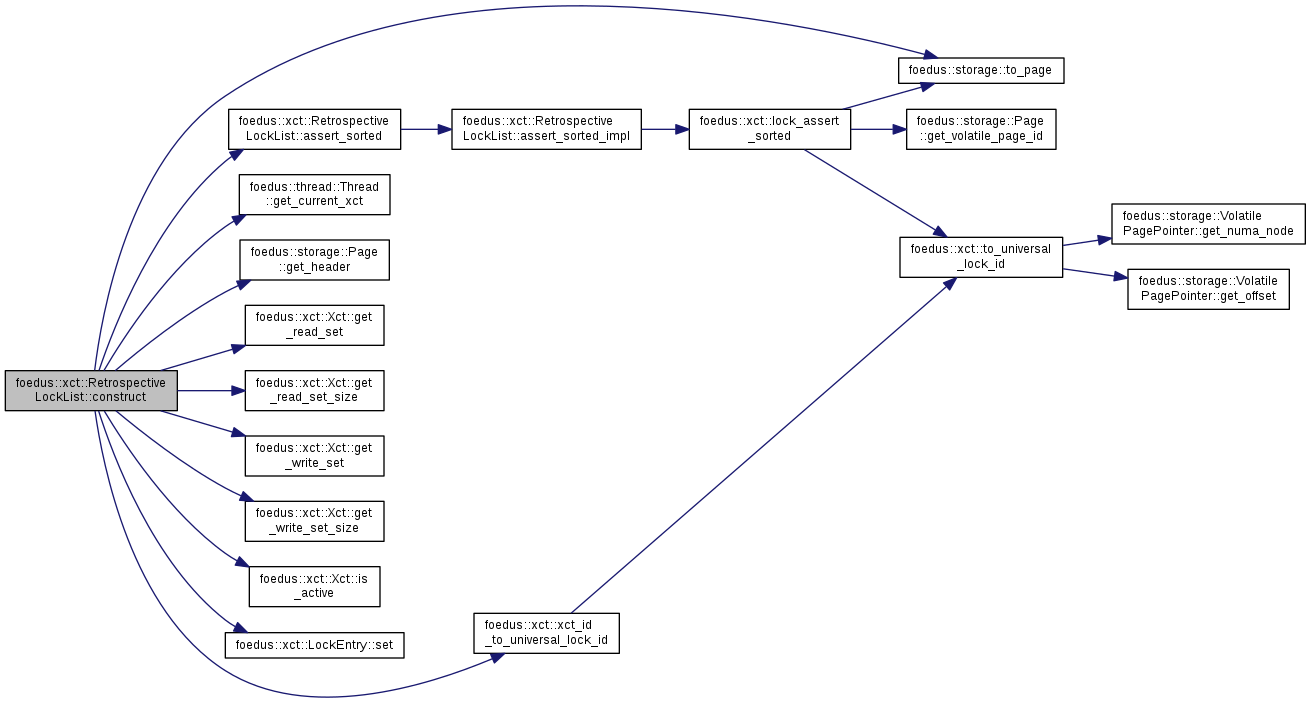

|
inline |
Definition at line 255 of file retrospective_lock_list.hpp.
|
inline |
Definition at line 234 of file retrospective_lock_list.hpp.
Referenced by foedus::xct::Xct::on_record_read_take_locks_if_needed(), and foedus::xct::CurrentLockList::prepopulate_for_retrospective_lock_list().
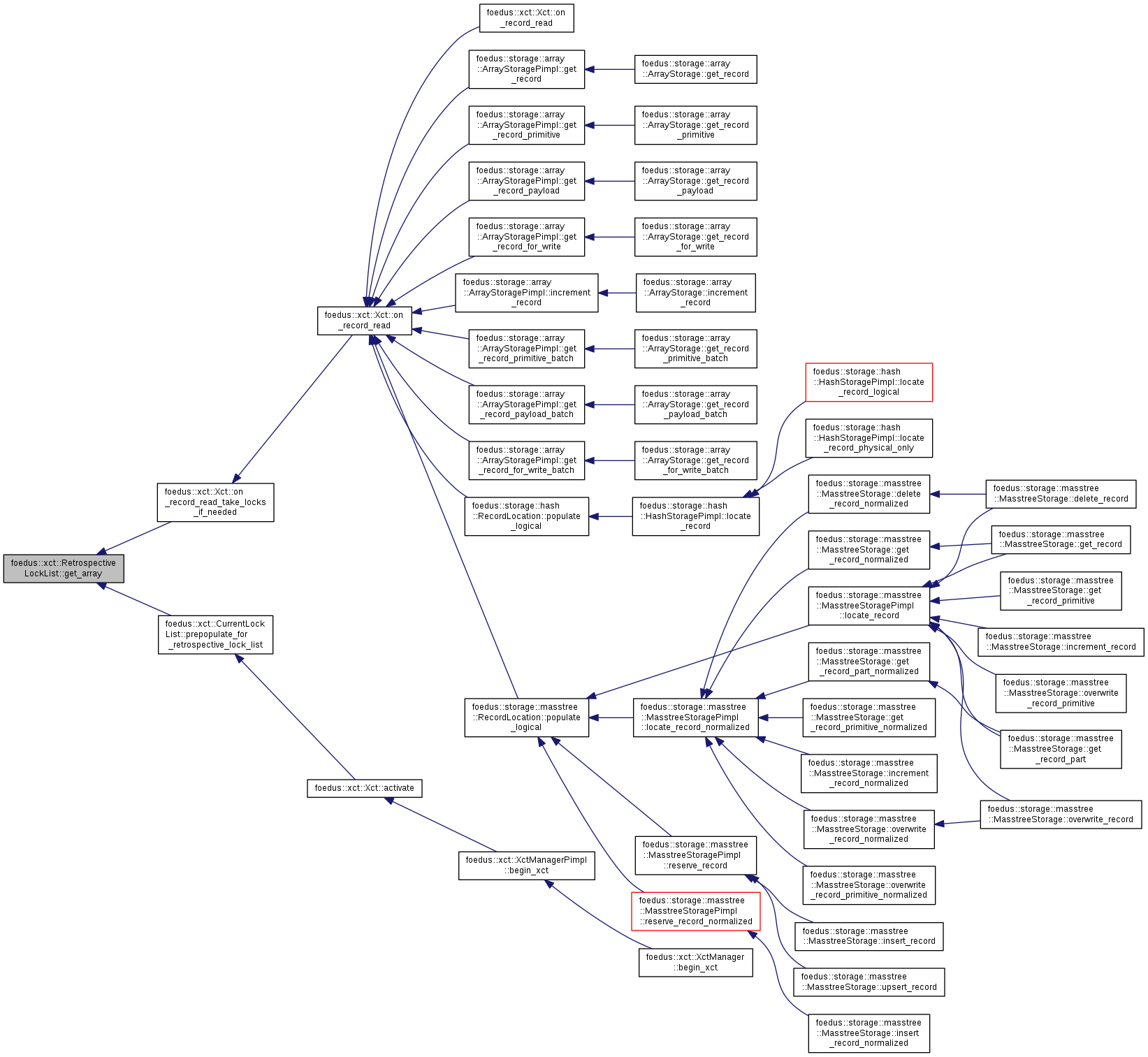
|
inline |
Definition at line 243 of file retrospective_lock_list.hpp.
|
inline |
Definition at line 235 of file retrospective_lock_list.hpp.
References ASSERT_ND, and is_valid_entry().

|
inline |
Definition at line 239 of file retrospective_lock_list.hpp.
References ASSERT_ND, and is_valid_entry().

|
inline |
Definition at line 244 of file retrospective_lock_list.hpp.
Referenced by foedus::xct::XctManagerPimpl::begin_xct(), and foedus::xct::CurrentLockList::prepopulate_for_retrospective_lock_list().

|
inline |
Definition at line 258 of file retrospective_lock_list.hpp.
Referenced by foedus::xct::Xct::add_to_read_set(), and foedus::xct::Xct::add_to_write_set().
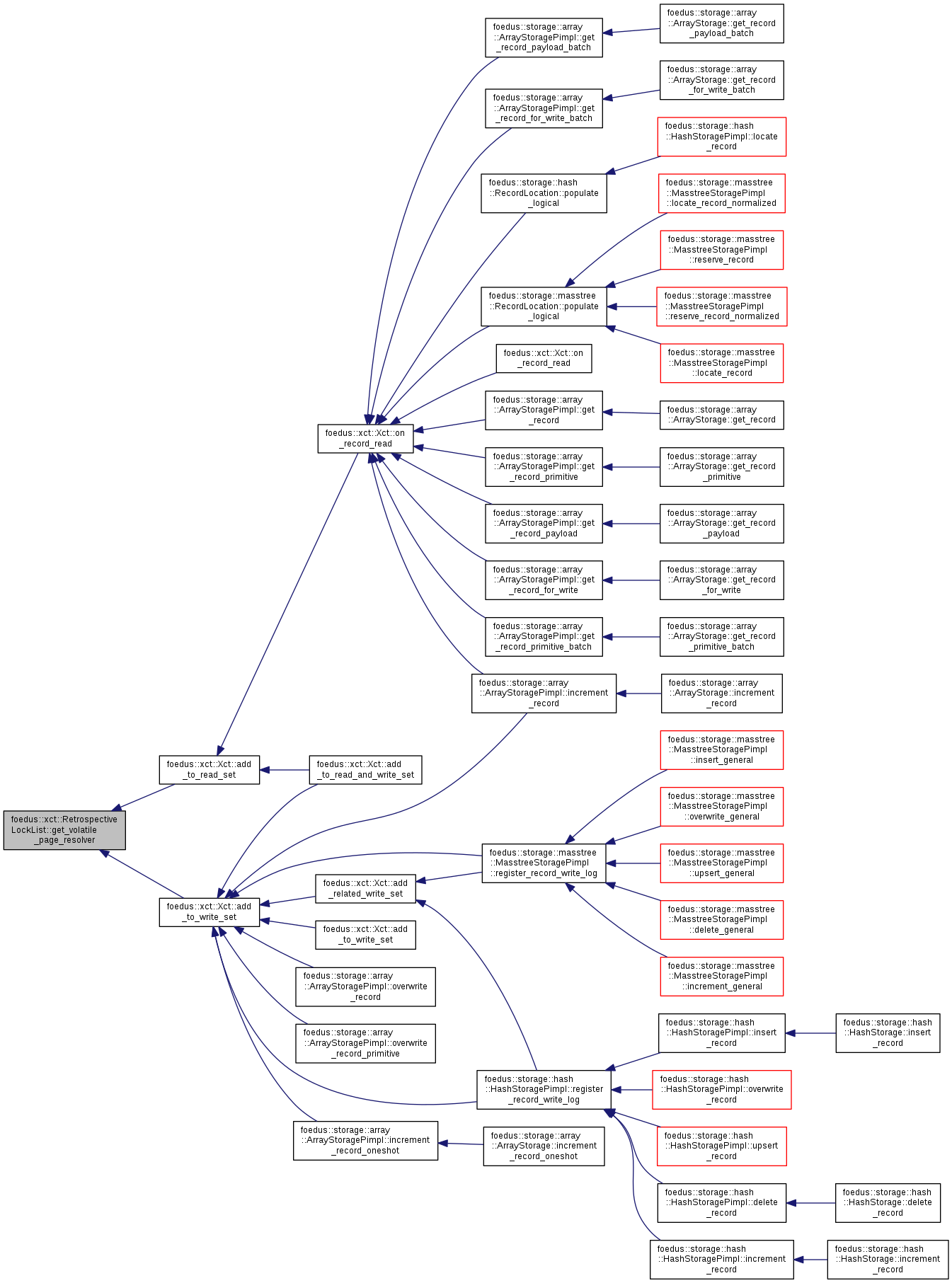
| void foedus::xct::RetrospectiveLockList::init | ( | LockEntry * | array, |
| uint32_t | capacity, | ||
| const memory::GlobalVolatilePageResolver & | resolver | ||
| ) |
Definition at line 49 of file retrospective_lock_list.cpp.
References clear_entries().
Referenced by foedus::xct::Xct::initialize().


|
inline |
Definition at line 248 of file retrospective_lock_list.hpp.
References foedus::xct::kLockListPositionInvalid.
Referenced by foedus::xct::Xct::activate(), foedus::xct::Xct::on_record_read_take_locks_if_needed(), and foedus::xct::CurrentLockList::prepopulate_for_retrospective_lock_list().
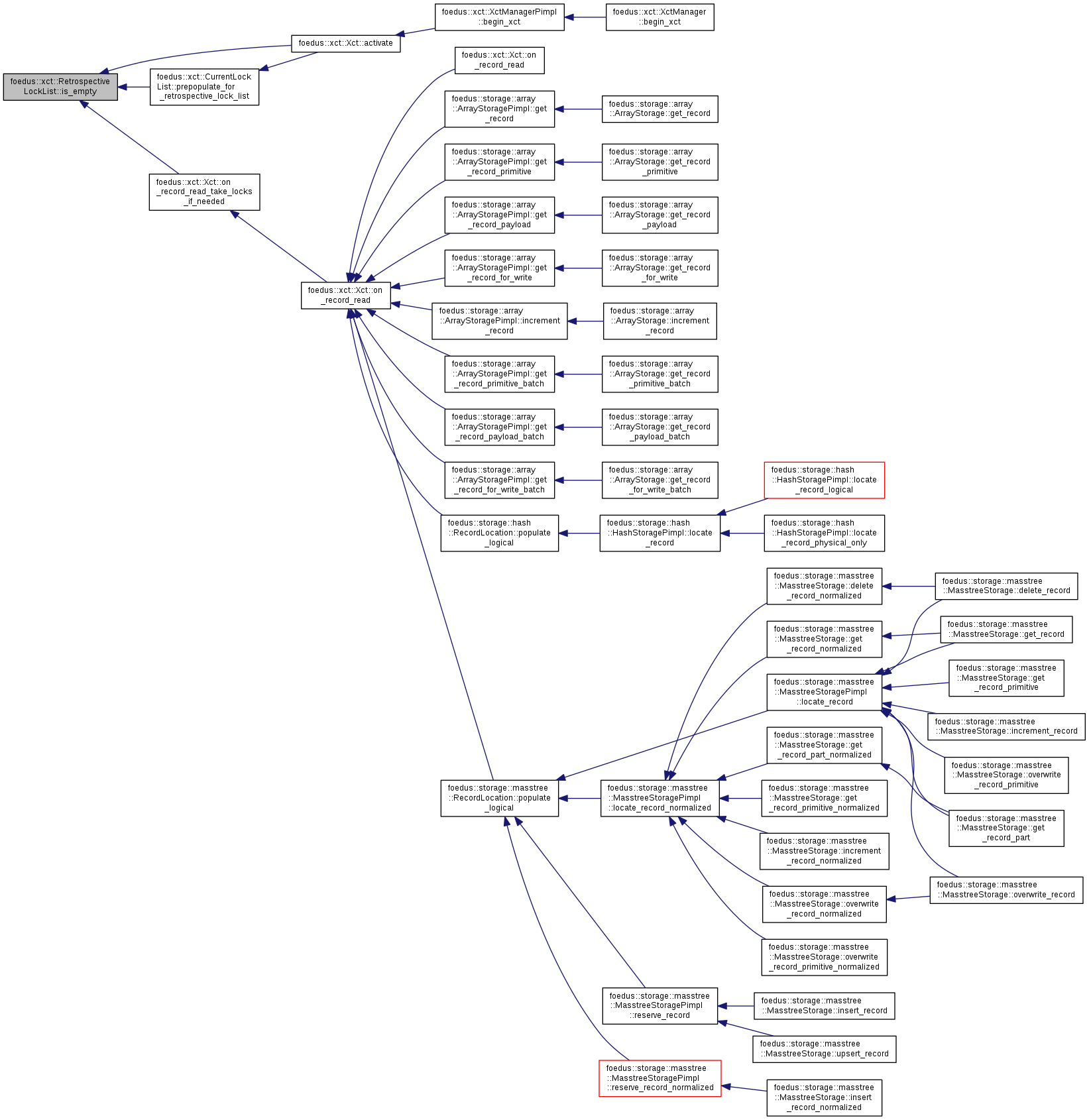
|
inline |
Definition at line 245 of file retrospective_lock_list.hpp.
References foedus::xct::kLockListPositionInvalid.
Referenced by get_entry().

| LockListPosition foedus::xct::RetrospectiveLockList::lower_bound | ( | UniversalLockId | lock | ) | const |
Analogous to std::lower_bound() for the given lock.
Definition at line 200 of file retrospective_lock_list.cpp.
| void foedus::xct::RetrospectiveLockList::uninit | ( | ) |
Definition at line 70 of file retrospective_lock_list.cpp.
References clear_entries().
Referenced by ~RetrospectiveLockList().


|
friend |
Definition at line 145 of file retrospective_lock_list.cpp.